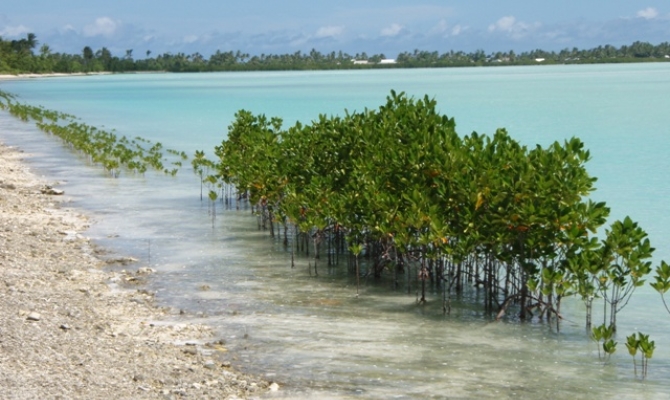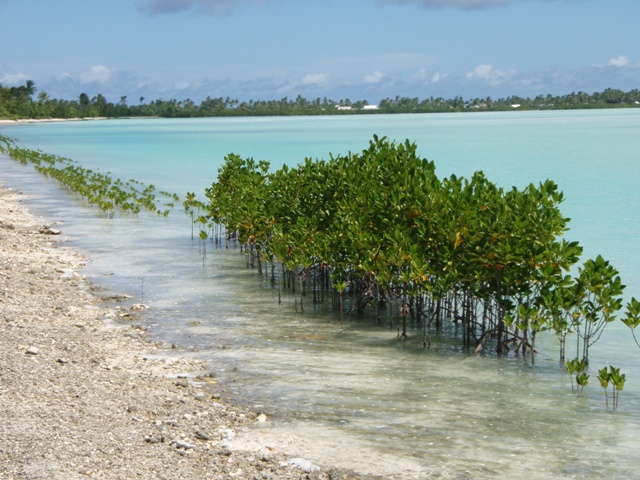
Island and Ocean Ecosystems
December 6 2013, Suva Fiji - By Carolyn Kitione, journalism student from USP:- A high risk community in Kiribati has started the replanting of mangroves among other land management activities in its efforts to reduce vulnerability to climate variability.

Kiribati national focal point for the Global Environment Facility's Small Grants Programme (SGP) Komeri Onorio said the Rurete community was at high risk of coastal erosion and seawater inundation of land properties.
"Indications are that changes in climate change and variability are continuing and increasing, severely impacting the Rurete communities who are at their most vulnerable status right now," said Mr Onorio during a panel discussion at the 9th Pacific Islands Conference on Nature Conservation and Protected Areas.
Activities carried out include replanting of mangroves, efficient waste management disposal, and increasing ecosystem resilience by promoting sustainable land management.
"GEF SGP CBA (community-based adaptation) projects can transform lives and lead to adaptive measures, sustainable solutions, improved environmental practices and more secure food, water and livelihood options," he said.
A two-year community-based adaptation project began last year which saw the need to strengthen capacity of community to respond to the climate variability and change.
The project, which received US$45,000 from the SGP, has helped the 500 people living in the Rurete community.
The SGP CBA project is a collaborative work between GEF, UNDP, AusAid and United Nations Volunteers (UNV).
The SGP provides financial and technical support to projects in 126 countries that conserve and restore the environment while enhancing people's well-being and livelihoods.
The main objective of the Rurete project is to enhance the community's capacity to cope with the increasing natural threats such as drought and adapt to climate change.
Mr. Onorio said that the Rurete Project was the first Small Islands Developing States (SIDS) CBA in Kiribati and has the potential for replication in 164 outer-island villages in Kiribati.
"The Office of the President in Kiribati is now developing a National Framework for climate change, so there is potential for collaborative work in this area particularly, in developing a national vulnerability risk assessment training module to be used throughout Kiribati."
Carolyn Kitione is a member of the Media Team providing coverage of the 9th Pacific Islands Conference on Nature Conservation and Protected Areas from 2 to 6 December in Suva, Fiji. This is a partnership between the Fiji National University (FNU), University of the South Pacific (USP), SPREP and Pacific Islands News Association (PINA) whereby a team of 10 journalism students are mentored by senior reporters as they cover the conference. This activity is funded by the Pacific Assistance Media Scheme (PACMAS).

Kiribati national focal point for the Global Environment Facility's Small Grants Programme (SGP) Komeri Onorio said the Rurete community was at high risk of coastal erosion and seawater inundation of land properties.
"Indications are that changes in climate change and variability are continuing and increasing, severely impacting the Rurete communities who are at their most vulnerable status right now," said Mr Onorio during a panel discussion at the 9th Pacific Islands Conference on Nature Conservation and Protected Areas.
Activities carried out include replanting of mangroves, efficient waste management disposal, and increasing ecosystem resilience by promoting sustainable land management.
"GEF SGP CBA (community-based adaptation) projects can transform lives and lead to adaptive measures, sustainable solutions, improved environmental practices and more secure food, water and livelihood options," he said.
A two-year community-based adaptation project began last year which saw the need to strengthen capacity of community to respond to the climate variability and change.
The project, which received US$45,000 from the SGP, has helped the 500 people living in the Rurete community.
The SGP CBA project is a collaborative work between GEF, UNDP, AusAid and United Nations Volunteers (UNV).
The SGP provides financial and technical support to projects in 126 countries that conserve and restore the environment while enhancing people's well-being and livelihoods.
The main objective of the Rurete project is to enhance the community's capacity to cope with the increasing natural threats such as drought and adapt to climate change.
Mr. Onorio said that the Rurete Project was the first Small Islands Developing States (SIDS) CBA in Kiribati and has the potential for replication in 164 outer-island villages in Kiribati.
"The Office of the President in Kiribati is now developing a National Framework for climate change, so there is potential for collaborative work in this area particularly, in developing a national vulnerability risk assessment training module to be used throughout Kiribati."
Carolyn Kitione is a member of the Media Team providing coverage of the 9th Pacific Islands Conference on Nature Conservation and Protected Areas from 2 to 6 December in Suva, Fiji. This is a partnership between the Fiji National University (FNU), University of the South Pacific (USP), SPREP and Pacific Islands News Association (PINA) whereby a team of 10 journalism students are mentored by senior reporters as they cover the conference. This activity is funded by the Pacific Assistance Media Scheme (PACMAS).